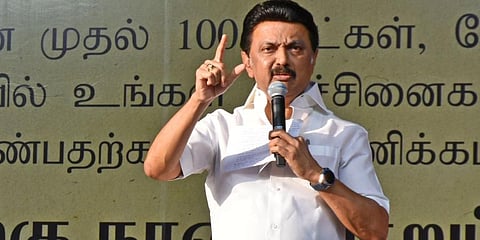Conversion only for reservation, without ‘actual belief’, a fraud on Constitution: Supreme Court
‘உண்மையான நம்பிக்கை’ இல்லாமல், இடஒதுக்கீட்டிற்காக மட்டுமே மதமாற்றம் செய்வது, அரசியலமைப்புச் சட்டத்தின் மீதான மோசடி: உச்ச நீதிமன்றம்
நீதிபதிகள் பங்கஜ் மிதால் மற்றும் ஆர் மகாதேவன் ஆகியோர் அடங்கிய பெஞ்ச், "உடனடி வழக்கில், மேல்முறையீடு செய்தவர் கிறிஸ்தவ மதத்தை ஒப்புக்கொள்கிறார் என்பதையும், தவறாமல் தேவாலயத்திற்குச் செல்வதன் மூலம் விசுவாசத்தை தீவிரமாக கடைப்பிடிப்பதையும் தெளிவாக நிரூபிக்கிறது" என்று கூறியது.
அனந்தகிருஷ்ணன் ஜி புது தில்லி எழுதியது | புதுப்பிக்கப்பட்டது: நவம்பர் 27, 2024 07:38 IST
உச்ச நீதிமன்றம், அரசியலமைப்பு, இந்திய மதச்சார்பற்ற நாடு, இந்தியன் எக்ஸ்பிரஸ் பெஞ்ச் எழுதும் நீதிபதி மகாதேவன், “இந்தியா ஒரு மதச்சார்பற்ற நாடு, அரசியலமைப்பின் 25 வது பிரிவின் கீழ் உத்தரவாதம் அளிக்கப்பட்டுள்ளபடி, ஒவ்வொரு குடிமகனுக்கும் அவரவர் விருப்பப்படி மதத்தை கடைப்பிடிக்கவும், பின்பற்றவும் உரிமை உண்டு. ."
பிற மதத்தில் "உண்மையான நம்பிக்கை" இல்லாமல் ஒதுக்கீட்டு நன்மைகளைப் பெறுவதற்காக மத மாற்றம் இட ஒதுக்கீடு கொள்கையின் சமூக நெறிமுறைகளைத் தோற்கடித்துவிடும் என்று உச்ச நீதிமன்றம் செவ்வாயன்று தீர்ப்பளித்தது. புதுச்சேரியில் அப்பர் டிவிஷன் கிளார்க் பணிக்கான சான்றிதழைத் தேடும் போது, தன்னை இந்து என்று கூறிக்கொண்டார்.
நீதிபதிகள் பங்கஜ் மிதால் மற்றும் ஆர் மகாதேவன் ஆகியோர் அடங்கிய பெஞ்ச், "உடனடி வழக்கில், மேல்முறையீடு செய்தவர் கிறிஸ்தவ மதத்தை ஒப்புக்கொள்கிறார் என்பதையும், தவறாமல் தேவாலயத்திற்குச் செல்வதன் மூலம் விசுவாசத்தை தீவிரமாக கடைப்பிடிப்பதையும் தெளிவாக நிரூபிக்கிறது" என்று கூறியது.
"அதே போதிலும், அவர் ஒரு இந்து என்று கூறிக்கொண்டு, வேலைவாய்ப்பின் நோக்கத்திற்காக பட்டியல் சாதி சமூக சான்றிதழை நாடுகிறார். அவர் கூறிய இரட்டைக் கூற்று ஏற்றுக்கொள்ள முடியாதது, ஞானஸ்நானம் பெற்ற பிறகும் அவர் தன்னை ஒரு இந்துவாக அடையாளப்படுத்திக் கொள்ள முடியாது” என்று பெஞ்ச் கூறியது. “எனவே, மதப்படி கிறிஸ்தவராக இருந்தாலும், வேலைவாய்ப்பில் இடஒதுக்கீட்டைப் பெறுவதற்காக மட்டுமே இந்து மதத்தைத் தழுவுவதாகக் கூறும் மேல்முறையீட்டாளருக்கு அட்டவணை சாதி வகுப்பு அந்தஸ்து வழங்குவது, இடஒதுக்கீட்டின் நோக்கத்திற்கு எதிரானது. அரசியலமைப்பின் மீதான மோசடி."
பட்டியலிடப்பட்ட சாதி ஒதுக்கீட்டிற்கு மதத்தை அளவுகோலாகப் பயன்படுத்துவதன் அரசியலமைப்புச் சட்டத்தின் மீதான பெரிய கேள்வி உச்ச நீதிமன்றத்தில் நிலுவையில் உள்ளது. இந்த மனுக்கள் அடிப்படையில் கிறிஸ்தவம் மற்றும் இஸ்லாம் மதத்திற்கு மாறிய தலித் மக்களுக்கு இடஒதுக்கீடு கோருகின்றன. குடியரசுத் தலைவர் பிறப்பித்த 1950 அரசியலமைப்பு (பட்டியலிடப்பட்ட சாதிகள்) ஆணை இந்துக்களுக்கு மட்டுமே SC அந்தஸ்தைக் கட்டாயமாக்குகிறது. இடஒதுக்கீட்டின் நோக்கங்களுக்காக, சீக்கியர்கள் மற்றும் பௌத்தர்களும் இந்துக்களாகக் கருதப்படுகிறார்கள். 2007 ஆம் ஆண்டில், மத மற்றும் மொழியியல் சிறுபான்மையினர் பற்றிய நீதிபதி ரங்கநாத் மிஸ்ரா கமிஷன் அறிக்கை, தலித் கிறிஸ்தவர்கள் மற்றும் முஸ்லிம்களுக்கு பட்டியல் சாதி ஒதுக்கீட்டை பரிந்துரைத்தது.
நீதிபதி மகாதேவன் பெஞ்ச் எழுதுகையில், “இந்தியா ஒரு மதச்சார்பற்ற நாடு. அரசியலமைப்பின் 25 வது பிரிவின் கீழ் உத்தரவாதம் அளிக்கப்பட்டுள்ளபடி ஒவ்வொரு குடிமகனுக்கும் தங்களுக்கு விருப்பமான ஒரு மதத்தை கடைப் பிடிப்பதற்கும் பின்பற்றுவதற்கும் உரிமை உள்ளது. ஒருவன் வேறு மதத்திற்கு மாறுகிறான், அவன்/அவள் அதன் கொள்கைகள், கோட்பாடுகள் மற்றும் ஆன்மீக எண்ணங்களால் உண்மையாக ஈர்க்கப்பட்டால். இருப்பினும், மதமாற்றத்தின் நோக்கம் இடஒதுக்கீட்டின் பலனைப் பெறுவதே தவிர, பிற மதத்தின் மீது உண்மையான நம்பிக்கை இல்லாமல் இருந்தால், அதை அனுமதிக்க முடியாது, ஏனெனில் இதுபோன்ற மறைமுக நோக்கங்களைக் கொண்ட மக்களுக்கு இடஒதுக்கீட்டின் பலன்களை விரிவுபடுத்துவது சமூகத்தைத் தோற்கடிக்கும். இடஒதுக்கீடு கொள்கையின் நெறிமுறைகள்."
மனுதாரர் சி செல்வராணி ஜனவரி 24, 2023 அன்று சென்னை உயர் நீதிமன்றத்தின் உத்தரவை எதிர்த்து, தனது ரிட் மனுவை தள்ளுபடி செய்தார்.
தான் இந்து மதத்தைப் பறைசாற்றுவதாகவும், தான் வள்ளுவன் சாதியைச் சேர்ந்தவள் என்றும், 1964 ஆம் ஆண்டு அரசியலமைப்புச் சட்டம் (பாண்டிச்சேரி) பட்டியலிடப்பட்ட சாதிகள் ஆணை, 1964ன் வரம்பிற்குள் வருவதாகவும், எனவே, ஆதி திராவிட ஒதுக்கீட்டின் கீழ் சலுகையைப் பெற தனக்கு உரிமை உண்டு என்றும் அவர் வாதிட்டார். பிறப்பிலிருந்தே தனக்கு இந்து மதத்தை எடுத்துரைப்பதில் ஈடுபாடு இருப்பதாகவும், கோயில்களுக்குச் சென்று இந்து தெய்வங்களை வழிபடுவதாகவும் செல்வராணி வாதிட்டார்.
மேல்முறையீடு செய்தவர், பல்வேறு ஆவணங்கள் மூலம், அவர் ஒரு இந்து தந்தை மற்றும் ஒரு கிறிஸ்தவ தாய்க்கு பிறந்தார் என்பதை நிரூபிக்க முடிந்தது என்று சமர்ப்பித்தார், மேலும் திருமணத்திற்குப் பிறகு, இந்து மதத்தை பின்பற்றத் தொடங்கினார்; அவளுடைய தாத்தா பாட்டி மற்றும் கொள்ளு தாத்தா வள்ளுவன் சாதியை சேர்ந்தவர்கள் என்று. அவர் தனது கல்வி வாழ்க்கை முழுவதும், அவர் SC சமூகத்தைச் சேர்ந்தவராகவே கருதப்பட்டதாகவும், இடமாற்றச் சான்றிதழ்கள் தனது வகுப்புவாத நிலையை உறுதிப்படுத்தியதாகவும் கூறினார்; மற்றும் அவரது தந்தை மற்றும் அவரது சகோதரர் எஸ்சி சான்றிதழ்களை வைத்திருந்தனர்.
இருப்பினும், வழக்கின் உண்மைகளை ஆய்வு செய்த பெஞ்ச், "விரிவான விசாரணைக்குப் பிறகு, கிராம நிர்வாக அதிகாரி சமர்ப்பித்த அறிக்கை மற்றும் சேகரிக்கப்பட்ட ஆவண ஆதாரங்கள் மூலம்" அவரது தந்தை பட்டியலிடப்பட்ட சமூகத்தைச் சேர்ந்தவர் என்பதையும், தாயார் கிறிஸ்தவர் என்பதையும் தெளிவாக நிறுவியது. கிறிஸ்தவ முறைப்படி திருமணம் நடந்தது. அது கூறியது, “அதன்பின், மேல்முறையீட்டாளரின் தந்தை ஞானஸ்நானம் மூலம் கிறிஸ்தவத்திற்கு மாறினார்; மேல் முறையீட்டாளரின் சகோதரரின் ஞானஸ்நானம் 07.05.1989 அன்று செய்யப்பட்டது; மேல்முறையீடு செய்தவர் 22.11.1990 அன்று பிறந்தார், மேலும் அவர் 06.01.1991 அன்று பாண்டிச்சேரி வில்லியனூரில் உள்ள லூர்து ஆலயத்தில் இரண்டு மாதங்களுக்குள் ஞானஸ்நானம் பெற்றார்.
"எனவே, மேல்முறையீடு செய்தவர் ஒரு கிறிஸ்தவராக பிறந்தவர் என்பது தெளிவாகிறது, மேலும் அவர் பட்டியலிடப்பட்ட சாதி பிரிவின் கீழ் சான்றிதழைப் பெற தகுதியற்றவர்" என்று அது கூறியது.
“ஆர்ய சமாஜ் மூலம் பரிந்துரைக்கப்பட்ட ஒரு நடைமுறையை பின்பற்றுவது மதமாற்ற முறைகளில் ஒன்றாகும். மதமாற்றத்தை வெளிப்படுத்துவதன் விளைவுக்கான ஒரு பொது அறிவிப்பும் செய்யப்பட்டிருக்கலாம்,” என்று அது கூறியது.
மூன்று மாதங்களுக்கும் குறைவான வயதில் ஞானஸ்நானம் செய்யப்பட்டது என்ற பெண்ணின் வாதத்தை நீதிமன்றம் "பலவீனமானது" என்று நிராகரித்தது, "அது எங்கள் நம்பிக்கையைத் தூண்டவில்லை, ஏனெனில் அவர் ஞானஸ்நானத்தின் பதிவை ரத்து செய்ய எந்த முயற்சியும் செய்யவில்லை அல்லது அவர் எதையும் தாக்கல் செய்யவில்லை. இது தொடர்பாக அறிவிப்பு வழக்கு”.
"இந்திய கிறிஸ்தவ திருமணச் சட்டம், 1872ன் கீழ் மேல்முறையீட்டாளரின் பெற்றோரின் திருமணப் பதிவு, மேல்முறையீட்டாளர் மற்றும் அவரது சகோதரரின் ஞானஸ்நானம் மற்றும் அவர்கள் தவறாமல் தேவாலயத்திற்குச் சென்றது ஆகியவைகளச் சரிபார்ப்பில் தெளிவாகத் தெரியவந்துள்ளது. … அவளோ அல்லது அவளது குடும்பமோ இந்து மதத்திற்கு திரும்பியதாகக் காட்டுவதற்கு எதுவும் பதிவு செய்யப் படவில்லை, மாறாக, மேல்முறையீடு செய்தவர் இன்னும் கிறிஸ்தவ மதத்தை ஏற்றுக்கொள்கிறார் என்ற உண்மைக் கண்டுபிடிப்பு உள்ளது”,
A bench of Justices Pankaj Mithal and R Mahadevan said that “in the instant case, the evidence presented clearly demonstrates that the appellant professes Christianity and actively practises the faith by attending church regularly”.
Written by Ananthakrishnan G New Delhi | Updated: November 27, 2024 07:38 IST
Supreme court, constitution, India secular country, indian expressWriting for the bench, Justice Mahadevan stated, “India is a secular country, and every citizen has the right to practice and profess a religion of their choice, as guaranteed under Article 25 of the Constitution."
Religious conversion merely to avail quota benefits without “actual belief” in the other religion would defeat the social ethos of the policy of reservation, the Supreme Court ruled Tuesday as it upheld a Madras High Court order denying Scheduled Caste certificate to a born Chrisitian woman who claimed to be a Hindu while seeking the certificate for an Upper Division Clerk job in Puducherry.
A bench of Justices Pankaj Mithal and R Mahadevan said that “in the instant case, the evidence presented clearly demonstrates that the appellant professes Christianity and actively practises the faith by attending church regularly”.
“Despite the same, she claims to be a Hindu and seeks for Scheduled Caste community certificate for the purpose of employment. Such a dual claim made by her is untenable and she cannot continue to identify herself as a Hindu after baptism,” the bench said. “Therefore, the conferment of Scheduled Caste communal status to the appellant, who is a Christian by religion, but claims to be still embracing Hinduism only for the purpose of availing reservation in employment, would go against the very object of reservation and would amount to fraud on the Constitution.”
A larger question on the constitutionality of using religion as a yardstick for Scheduled Caste quota is pending before the Supreme Court. The pleas essentially seek reservation for Dalit converts to Christianity and Islam. The 1950 Constitution (Scheduled Castes) Order issued by the President mandates SC status only for Hindus. For the purposes of reservation, Sikhs and Buddhists are also considered Hindus. In 2007, Justice Ranganath Mishra Commission report on Religious and Linguistic Minorities, had recommended Scheduled Caste quota for Dalit Christians and Muslims.
Writing for the bench on Tuesday, Justice Mahadevan said, “India is a secular country. Every citizen has a right to practise and profess a religion of their choice as guaranteed under Article 25 of the Constitution. One converts to a different religion, when he/she is genuinely inspired by its principles, tenets and spiritual thoughts. However, if the purpose of conversion is largely to derive the benefits of reservation but not with any actual belief in the other religion, the same cannot be permitted, as the extension of benefits of reservation to people with such ulterior motives will only defeat the social ethos of the policy of reservation.”
Appellant C Selvarani had challenged the January 24, 2023 order of the Madras High Court, which dismissed her writ petition.
She contended that she professes the Hindu religion and she belongs to Valluvan caste, which falls within the ambit of the The Constitution (Pondicherry) Scheduled Castes Order, 1964 and hence, she is entitled to get concession under the Adi Dravida quota. Selvarani argued that right from birth, she has affinity in professing Hinduism and has been going to temples and worshipping Hindu deities.
The appellant submitted that through various documents, she had been able to prove that she was born to a Hindu father and a Christian mother, who also, after marriage, started to profess the Hindu religion; that her grandparents and great grandparents belonged to Valluvan caste. She also claimed that throughout her educational career, she was treated as belonging to the SC community and the transfer certificates also affirmed her communal status as such; and that her father, and her brother possessed SC certificates.
However, the bench which perused the facts of the case said “the report submitted by the Village Administrative Officer, after a detailed enquiry and through the documentary evidence collected” clearly establish that her father belonged to Scheduled Caste community and mother was a Christian and their marriage was performed as per the Christian rituals. It said that “thereafter, the appellant’s father had converted to Christianity through baptism; baptism of the appellant’s brother was done on 07.05.1989; and the appellant was born on 22.11.1990 and she was baptized on 06.01.1991 at Lourdes Shrine, Villianur, Pondicherry within two months”.
“Therefore, it is clear that the appellant was a born Christian and she would not be entitled to claim the certificate under Scheduled Caste category,” it said.
The bench said “the appellant and her family, if they really intended to get themselves converted, ought to have done some positive act to evince such conversion rather than a meek claim to be practising Hinduism”.
“One of the methods of conversion is by adopting a procedure prescribed through the Arya Samaj. A public declaration to the effect of evincing conversion could also have been made,” it said.
The court rejected as “feeble” the woman’s argument that her baptism was done when she was less than three months old, saying “the same does not inspire our confidence as she did not make any attempt to cancel the registration of baptism nor she filed any declaratory suit in this regard”.
The court said that “the field verification clearly revealed the registration of the marriage of the parents of the appellant under the Indian Christian Marriage Act, 1872, the baptism of the appellant and her brother and also the fact that they had been regularly attending the church… There is nothing on record to show that she or her family has reconverted to Hinduism and on the contrary, there is a factual finding that the appellant still professes Christianity”.
© The Indian Express Pvt Ltd Ananthakrishnan G First uploaded on: 27-11-2024 at 04:00 IST
)





